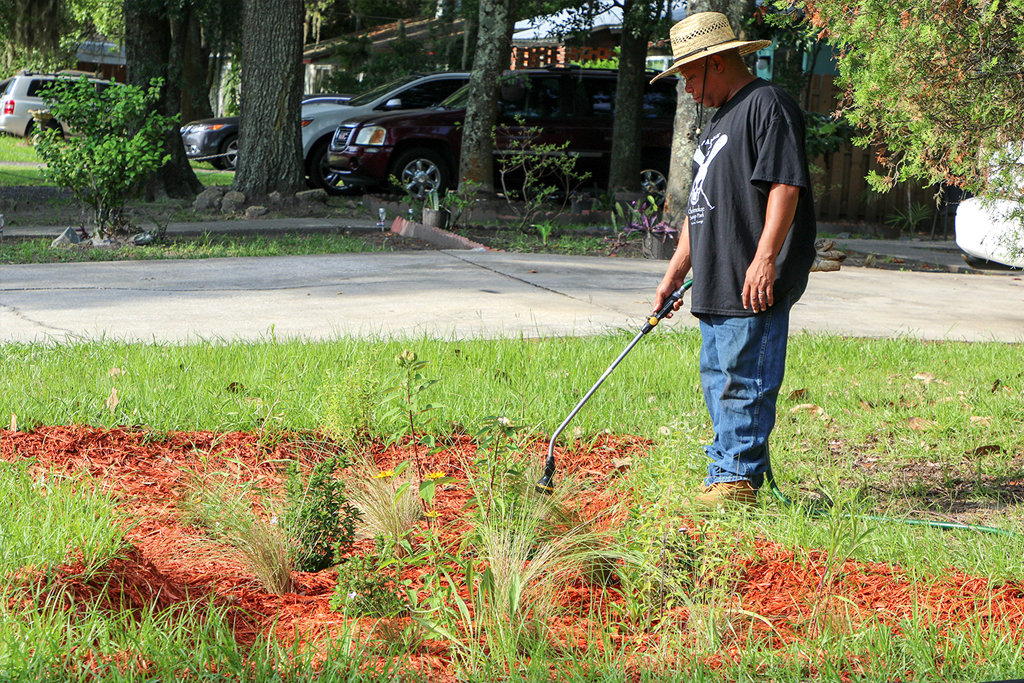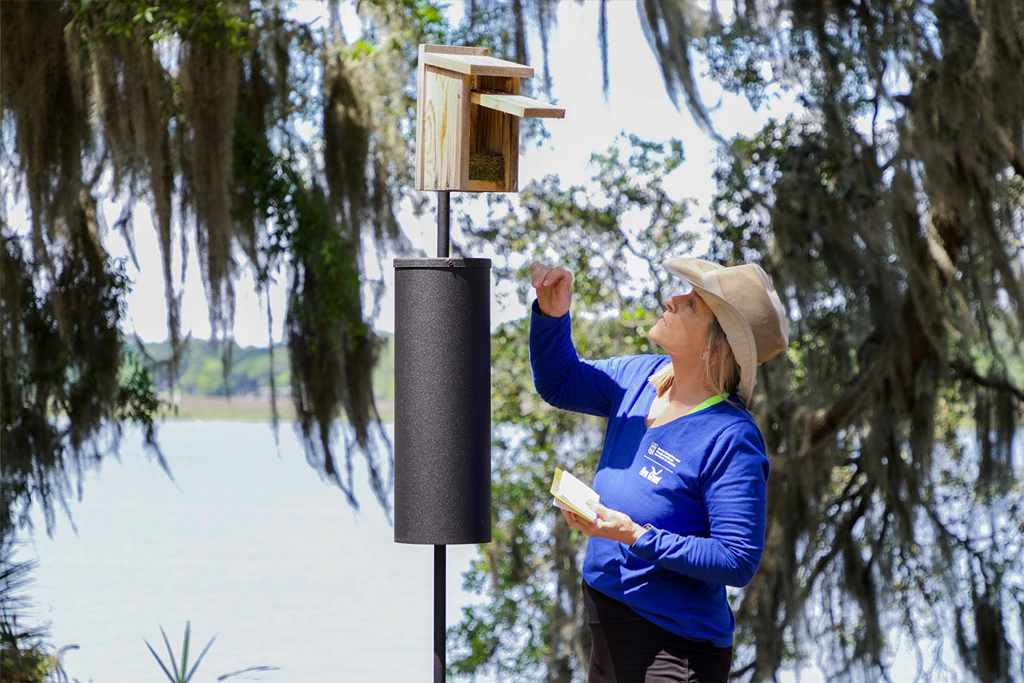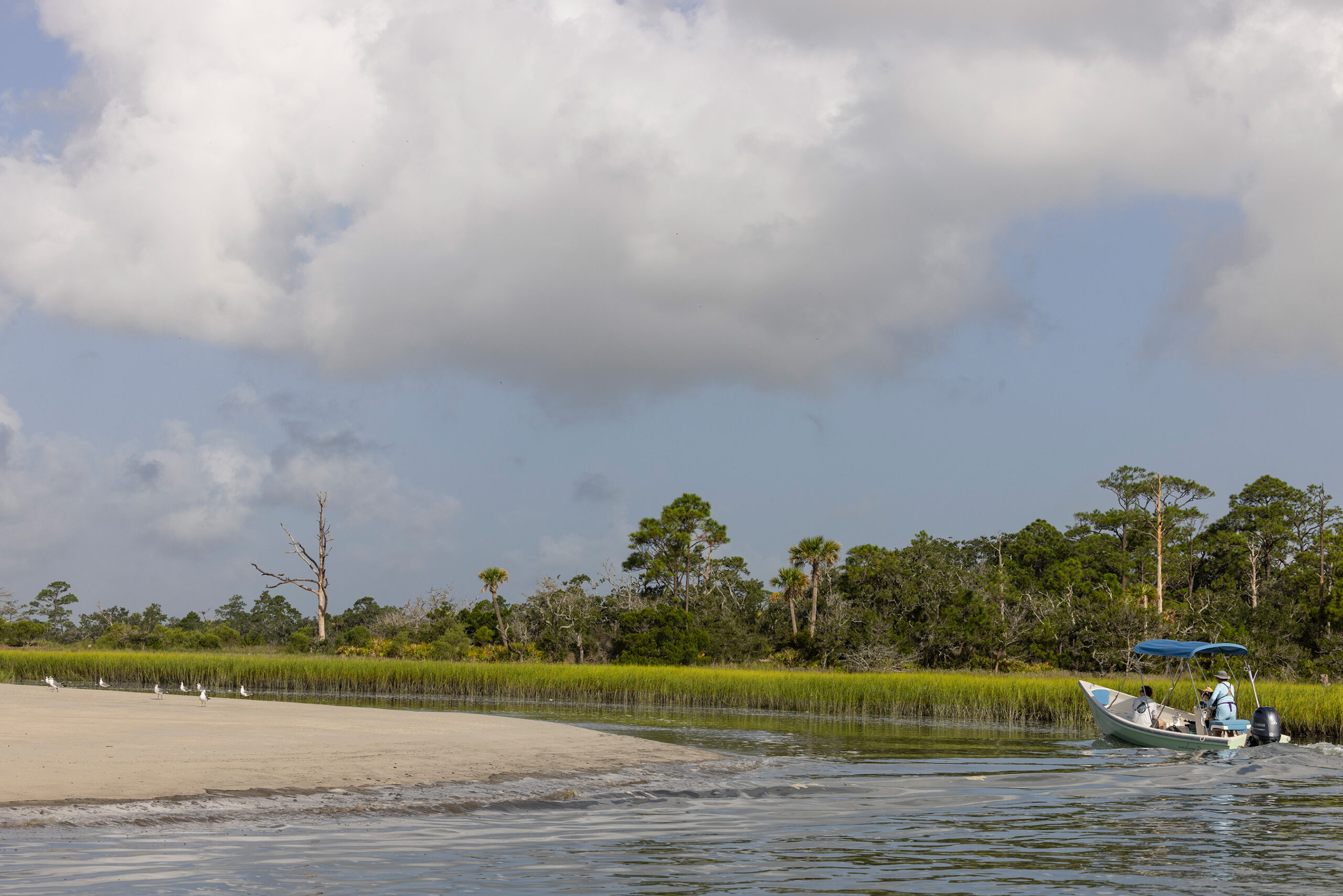Shoring up ecotourism in Georgia
To visit the most pristine areas of Georgia’s barrier islands, you’ll likely need to hire one of the mom-and-pop ecotourism businesses that charter tours to these enchanting but sensitive places. An award-winning UGA program trains these ecotour guides to give enriching tours without disturbing fragile ecosystems.
File Under
On a clear sunny day on the Georgia coast, ecotour charter captain Rene Heidt deftly maneuvers an aqua blue skiff through the hairpin turns of a narrow marsh waterway. Cordgrass reaches overhead, and there’s no building, power line, or cell tower in sight.
This is Jack’s Cut, a winding creek coursing through grassy marshland on Little Tybee Island. Unlike Tybee Island, its better-known big sister to the north, Little Tybee is protected from development by the state.
In these grasses, Heidt points out, a million fiddler crabs per acre feed in the area; shorebirds and diamondback terrapins then eat the crabs. When the creek widens, Heidt, co-owner and a captain for Tybee-based Sundial Charter Tours, steers tour guests to an undisturbed beachhead.
After anchoring the boat, she sets up a tripod-mounted spotting scope. It’s in an ideal location for visitors to view a nearby mudflat, where a revolving cast of birds, including the pink Roseate Spoonbill and the elegant brown Whimbrel, with its uniquely curved bill, might come to eat, rest, and nest.
In this setting, it’s easy to appreciate why the state has done so much to protect its barrier islands from development.
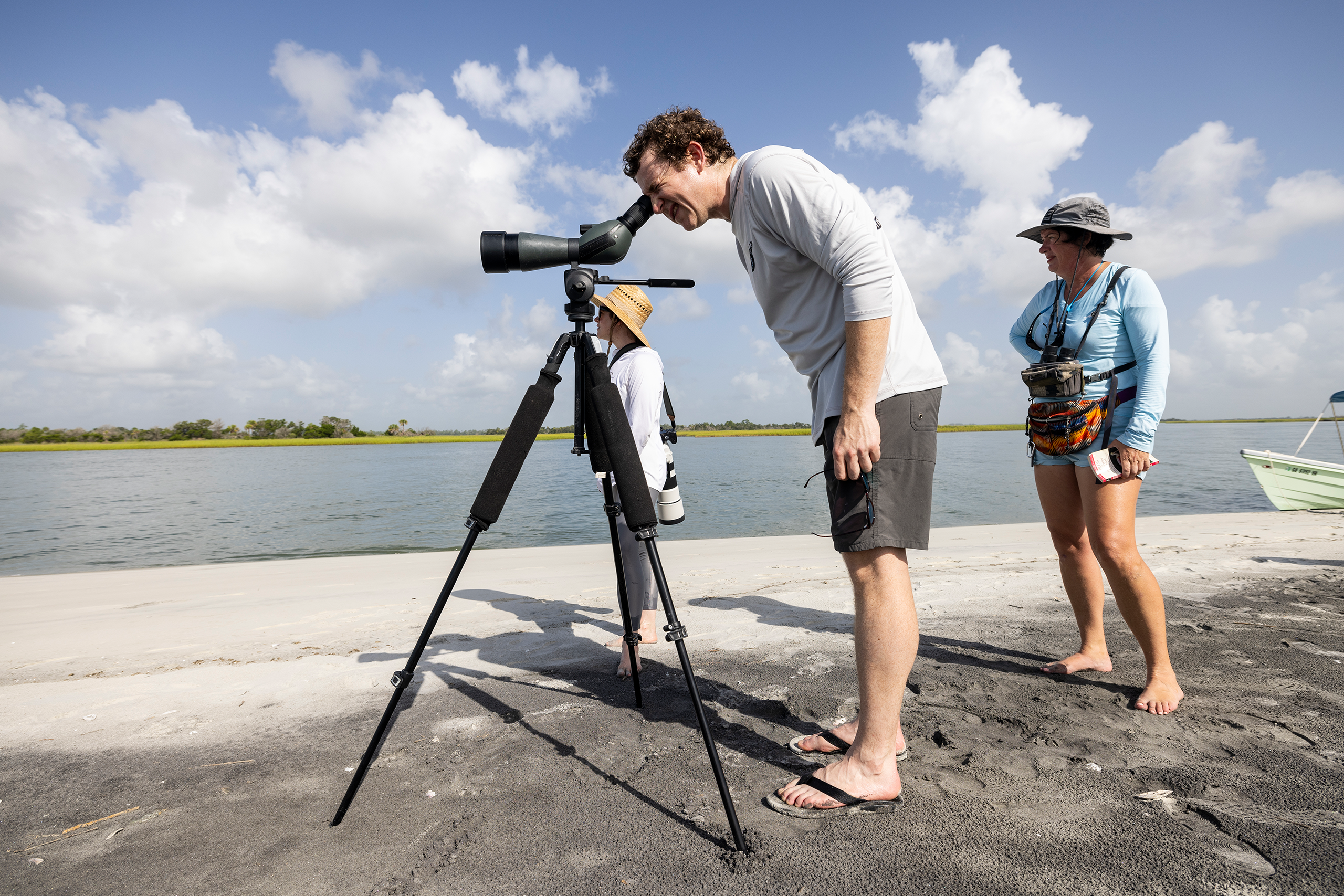
Heidt’s charter company offers ecotours and fossil hunts for visitors looking to experience Georgia’s wild coast. Heidt is a 15-year industry veteran. And much of what she shares on the tours comes from her experiences. But more recently, a certificate program designed to support ecotour guides like Heidt has helped her refine the information she shares with clients and how she takes them through sensitive ecosystems.
The University of Georgia’s Coastal Awareness and Responsible Ecotourism certification program, or CARE program, promotes sustainable water-based tourism on the Georgia coast, including paddle outfitters and charter boat companies.
The program offers up-to-date educational material and training to professionals like Heidt and provides certification that confirms their commitment to preserving the habitats they share with the public. Ultimately, the program works to help sustain tourism on Georgia’s coast, contributing to the state tourism industry’s annual $54 billion economic impact.
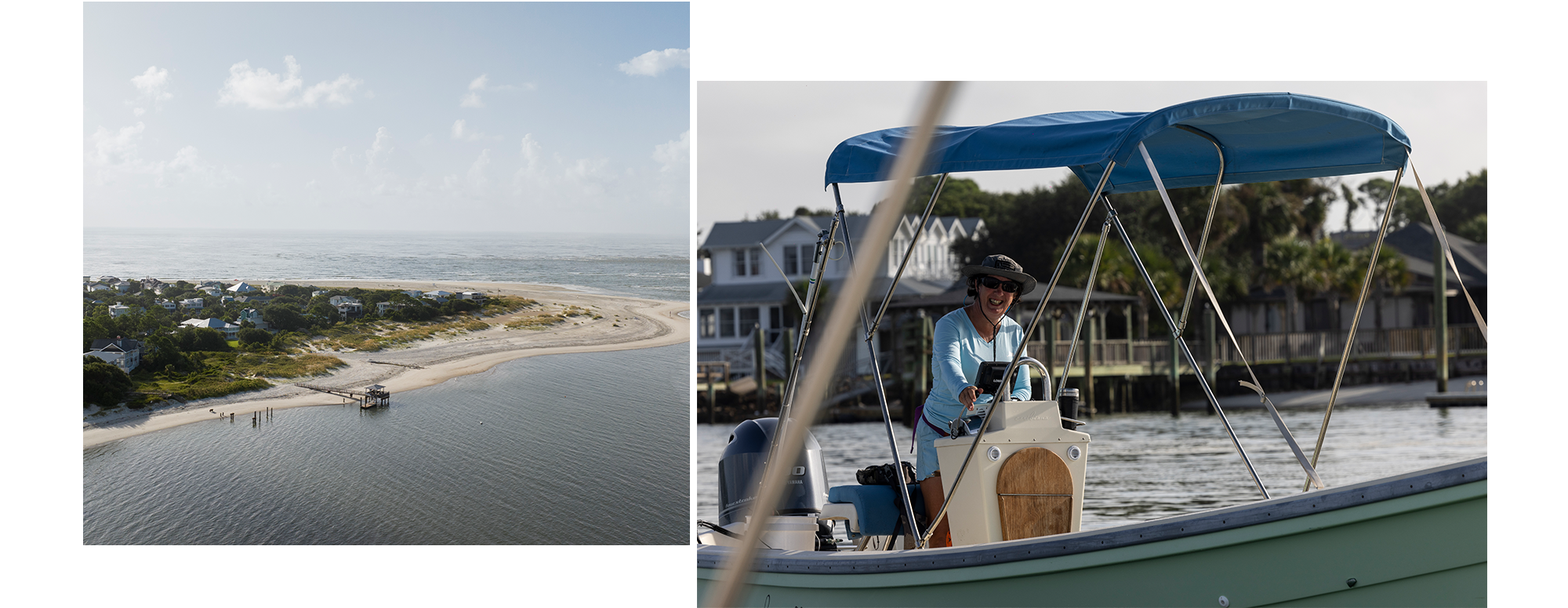
Georgia’s unique coast
“Georgia is a very special place,” says Katie Higgins, a faculty member and educator at UGA Marine Extension and Georgia Sea Grant, a UGA Public Service and Outreach unit based on Skidaway Island.
Higgins helped launch the ecotourism program in 2020 through a partnership with Marine Extension and Georgia Sea Grant, the nonprofit Manomet, and the Georgia Department of Natural Resources.
So what makes the Georgia coast different?
For starters, 11 of Georgia’s 14 barrier islands aren’t connected to the mainland by bridges. Shorelines aren’t as developed with hotels, roads, and seawalls as in other eastern states.
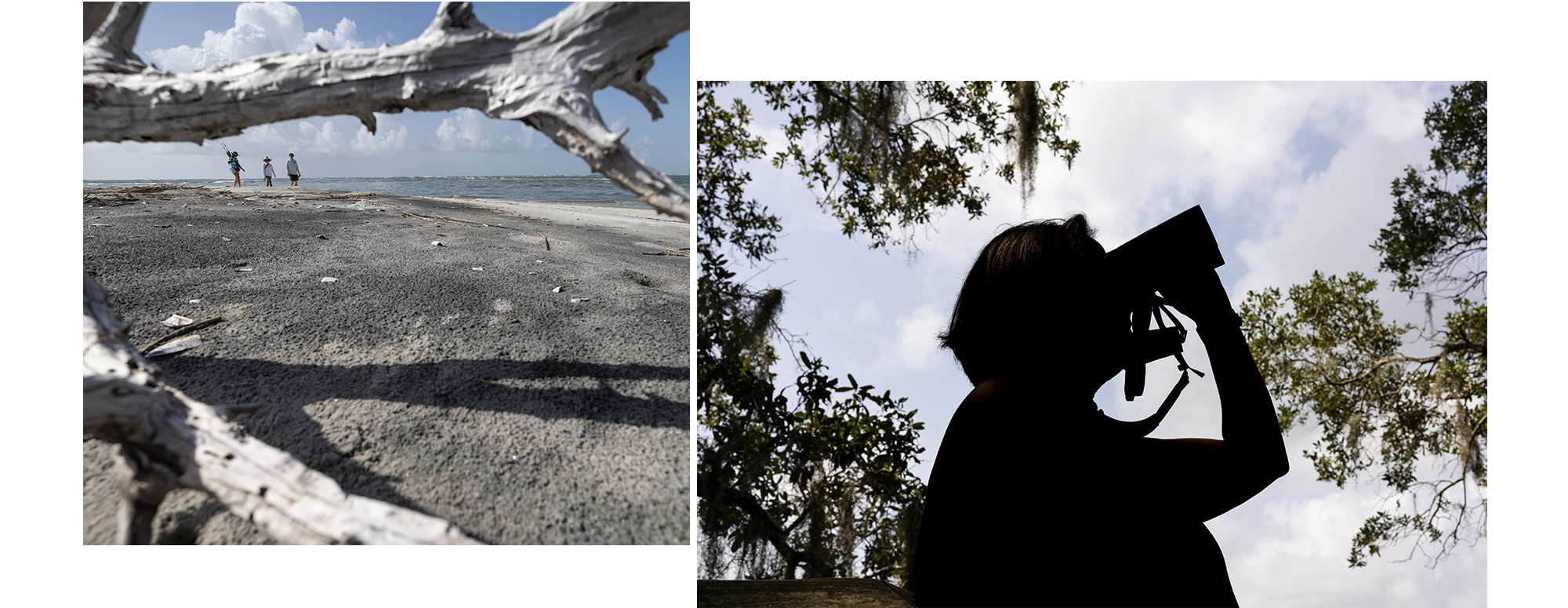
That lack of development comes with advantages beyond the spectacular, unobstructed views.
Georgia’s barrier islands have the flexibility to weather tropical storms and hurricanes, protecting the mainland from storm surges. It also means that coastal ecosystems are intact and support abundant wildlife, including crabs, sea turtles, and tens of thousands of migrating shorebirds.
“We’re very unique along the eastern coast as far as the diversity of habitats for wildlife.”
“We’re very unique along the eastern coast as far as the diversity of habitats for wildlife,” she says.
But without infrastructure, the only way to witness many of these ecosystems is by boat. For visitors to the coast, ecotourism provides this access while—when done well—preserving these fragile habitats.
Why CARE?
Before the program launched, there was no formal training for water-based ecotourism on Georgia’s coast.
The 14-week course is conducted primarily online and brings UGA faculty and other experts to teach about the local coastal ecosystems.

To build the curriculum, UGA Marine Extension and Georgia Sea Grant worked with Manomet, an organization focused on science education and preserving coastal ecosystems and bird populations in the western hemisphere.
“(UGA Marine Extension and Georgia Sea Grant) changed the way I give tours. They helped me to be more mindful of a charter boat’s impact on the very thing we are trying to teach people about.”
While program participants learn about Georgia’s natural resources, they also discuss how to visit these sensitive areas responsibly.
Though Heidt has always been careful, she says she still had plenty to learn.
“They changed the way I give tours. They helped me to be more mindful of a charter boat’s impact on the very thing we are trying to teach people about.”
In practice, that has meant small changes in how she operates her boat and where she lets her clients venture.
While the sustainability of these habitats is a significant part of the program’s curriculum, the region’s economic health also plays a role. The course encourages economic and community engagement by requiring service and continuing education for recertification.

“Responsible ecotourism takes into account not only stewardship of natural resources, but also contributing to the local economy and local people.”
“Responsible ecotourism takes into account not only stewardship of natural resources,” Higgins says, “but also contributing to the local economy and local people.”
So far, 44 guides from 23 organizations have already completed the course. These guides have shared program content with approximately 14,500 tour guests.
In October 2023, the National Extension Tourism Network recognized the program with the Excellence in Tourism Collaboration Award. That award noted Marine Extension and Georgia Sea Grant’s collaboration with Manomet and the Georgia Department of Natural Resources.
For the Birds
A major emphasis of the Coastal Awareness and Responsible Ecotourism certification is understanding, appreciating, and protecting shorebirds, which offer the most obvious and sometimes colorful evidence of a diverse ecosystem.
Roughly 300,000 shorebirds flock to Georgia’s coast annually. They range from the rare (piping plover and gull-billed tern) to the elegant (the great egret and tricolored heron) to the fierce (bald eagle, osprey, and the peregrine falcon, the world’s fastest bird).
Some bird lovers say it can be hard to appreciate the appeal of birding until you’ve really spent some time observing these animals and their behavior. But once you’ve found an interest, you’re hooked.
That was the case with Kathryn Lapolla, the co-owner of Savannah Coastal Ecotours. Lapolla spent her entire career as a reference and school librarian before retiring to the coast with her husband, Fran, and falling in love with Georgia’s wild beaches.
The Lapollas started their business to spend more time on the water. But as much as Kathryn loved being in nature, she didn’t find anything particularly special about the birds.
That changed when she completed the CARE program in 2021 and began learning more about the shorebirds who pass through Georgia—some traveling remarkable distances—and how to spot them in their natural environment.
“I learned to pay more attention to them,” Lapolla says. “I was dazzled to learn about their 5,000-mile journey.”

Kathryn Lapolla, co-owner of Savannah Coastal Ecotours, kayaks through Intracoastal Waterways on the Georgia coast.
Why it matters
“It’s a gorgeous coast,” she says. “And it’s important to share it with others to help them see: This is worth protecting.”
When Lapolla gives kayaking tours through Intracoastal Waterways and barrier coastal islands, she provokes an atmosphere of quiet reverence for the ecosystems she’s showing off. She paddles delicately across the water, barely disturbing the surface.
When she passes her binoculars to help a guest see a bald eagle high in a tree or shares a fact about marsh grass, her voice doesn’t rise above a whisper, a skill she must have perfected in her previous career.
Lapolla grew up in Atlanta, unaware of the natural beauty of the Georgia coast. Her family had always visited the well-developed beaches in South Carolina and Florida.
Now that she’s discovered it, she wants others to know about it.
Getting certified through the CARE program also has advantages for her business, Lapolla says. Her Savannah Coastal Ecotours website prominently displays a seal verifying her certification right across from a TripAdvisor Traveler’s Choice award.
But mostly, the program allowed her to learn more about this environment. And that’s knowledge she passes along to her guests.
“It’s a gorgeous coast,” she says. “And it’s important to share it with others to help them see: This is worth protecting.”

